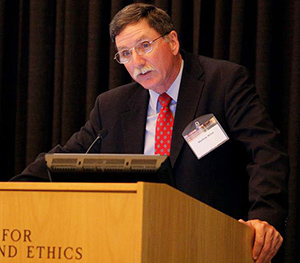By Robert Dilday
A pastor and cattle farmer in rural Southside Virginia has been tapped to advocate in the state’s legislature for First Amendment issues on behalf of the Baptist General Association of Virginia’s religious liberty committee — the first time in decades that a component of the 1,400-church BGAV has had that kind of presence in the General Assembly.
Shelton Miles, a long-time proponent of religious freedom with extensive experience in addressing public policy issues, will register as a legislative lobbyist. He’s taking the assignment on a voluntary basis without compensation.
 Miles said his role is to express a historic Virginia Baptist balance on the issue. “We promote a robust free exercise but also steadfastly oppose any establishment of religion,” he said. “We defend the voluntary principle and oppose any coercion.”
Miles said his role is to express a historic Virginia Baptist balance on the issue. “We promote a robust free exercise but also steadfastly oppose any establishment of religion,” he said. “We defend the voluntary principle and oppose any coercion.”
He’ll largely restrict himself to representing issues addressed by the religious liberty committee, which often adopts statements on proposed legislation. He’ll also cite specific resolutions adopted by the BGAV.
“No one is freelancing here,” he said. “And it’s not our intention to expand this to other [public policy] issues. The religious liberty committee is clear — we’re not the ethics committee and we don’t have a mandate to speak on any other issues except religious liberty.”
For the past 24 years, Miles has been pastor of First Baptist Church of Republican Grove in Nathalie, Va., about 60 miles northeast of Danville. He also “runs cattle” on land his great-grandfather bought in 1844. His family has farmed the rolling hillsides of that part of Virginia’s Piedmont region since 1785.
Those close ties to the land developed in him an early interest in the water quality of the state’s rivers, especially the nearby Staunton River. He became an activist on several citizens’ and advisory committees, and eventually was appointed chair of the State Water Control Board, a position he held for six years. Last year Virginia Military Institute presented Miles its environmental leadership award.
Fierce commitment
But the lifelong Virginian also absorbed the fierce commitment to religious liberty which has characterized Virginia Baptists since the 18th century. Persecution of Baptists and other dissenters from the Church of England was a common feature of colonial Virginia, whose leaders often jailed Baptist ministers for preaching without a license. That prompted Baptists to encourage the new state to adopt in 1789 a statute for religious freedom, which became a model for the U.S. Constitution’s First Amendment.
The Baptist General Association of Virginia, organized in 1823, inherited that passion for religious liberty, and early in its history created a standing committee to monitor relevant legislation.
Miles took that commitment to heart, maintaining it during brief stints outside of the state at Carson-Newman College in Jefferson City, Tenn., and at both Southern Baptist Theological Seminary in Louisville, Ky., and Southeastern Baptist Theological Seminary in Wake Forest, N.C.
In 1986, dismayed by the Southern Baptist Convention’s anticipated withdrawal of support for the Baptist Joint Committee, he recruited leaders to urge the BGAV to replace any loss of funding for the SBC’s longtime religious liberty advocate. At the BGAV’s annual meeting that year, he told messengers they were surrounded by a “great cloud of witnesses” of early Virginia Baptist leaders who fought for religious liberty. The motion passed.
“I wasn’t known at all,” Miles recalls. “I was just a bivocational pastor who took seriously everything about religious liberty I had read in the Religious Herald [now ABPnews/Herald] and had been written by [Virginia Baptist historian] Fred Anderson, and I had some biblical and denominational convictions.”
Those convictions put Miles in the chair of the BGAV religious liberty committee last year. In discussing the most effective way to communicate its positions, the committee discovered only one registered lobbyist at the General Assembly identified as a Baptist — the pastor of an independent church. That persuaded them to adopt a new approach and asked Miles to take it on. He’ll continue his advocacy role beyond his term as committee chair.
“Our agenda is simply to stay with historical Virginia Baptist understandings of the balance between religious freedom and nonestablishment, to find that spot on the knife edge,” he said. “This is an interesting age. Those on the secular left don’t want any religion in the public square at all. They say freedom of religion means we won’t close down your church. On the other end of the spectrum are those still trying to push the envelope of government establishment of religion, largely as a pushback against what they see as huge cultural change.”
But on this issue, “Virginia Baptists are in the same spot we’ve always been.”
